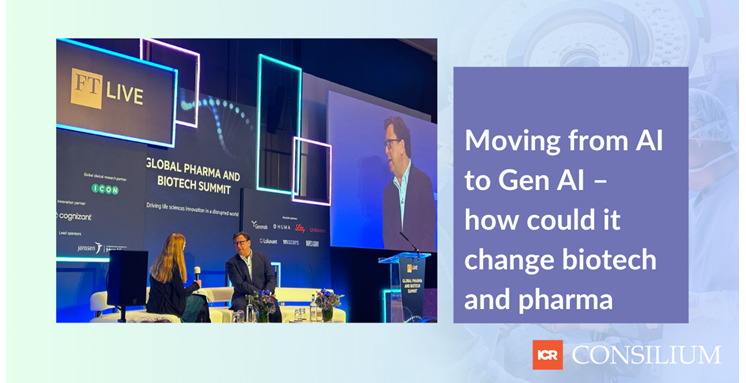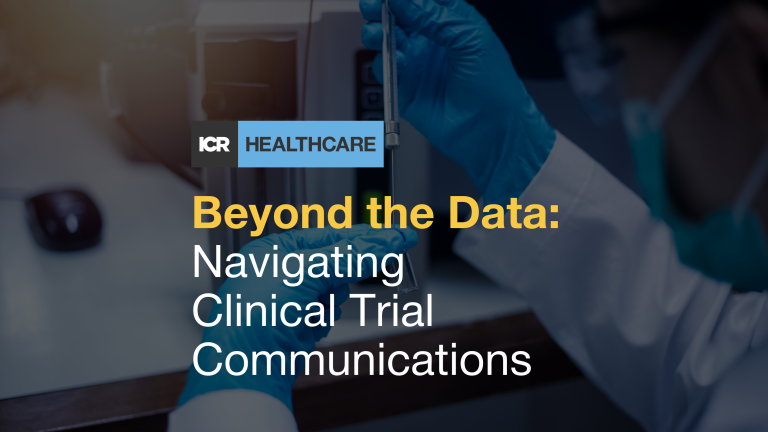
Headlining the bill at the FT Global Pharma and Biotech Summit this week was the theme of technology and how it can be used to transform the healthcare industry. Across the panels, the value and impact of how companies use the latest innovations to adapt to the changing world of healthcare and how its delivered, was debated. Moving from treatment to prevention, decentralising treatment to the home and local health clinics, and delivering true precision medicine, were all discussed as areas that could be powered by the technology-led revolution we are in the middle of.
Interestingly, the definition of the term Artificial Intelligence sparked wide debate. On the investment panel, there was commentary about how AI is a term thrown around about everything that crosses investors’ desks. In reality, this is no surprise and I regularly hear discussion about whether the use of data and algorithms really fits the definition of AI. As far as this conference is concerned, that debate can be put to bed as each pharma and biotech panellist explained they use AI in everything they do from conducting clinical research, to optimising supply chains, to rapid screening for diseases. As Paul Hudson, CEO of Sanofi put it when interviewed on the stage, “If we believe that AI is optional, then we have lost.”
We are already seeing the benefits of AI approaches, however, with the advent of Generative AI, widely known as Gen AI, we really have not seen anything yet. This next technological leap can be simply explained as a form of machine learning that is able to produce text, video, images, and other types of content. However, when you consider what that means in practice, the impact Gen AI could have on healthcare will be transformative in the right hands. These benefits were discussed throughout the conference and Paul Hudson confidently talked about how Sanofi is bridging from AI to Gen AI, characterising Sanofi’s position as: “It’s a race of turtles, and we are the lead turtle”.
Dan Vahdat, Founder and CEO of Huma Therapeutics, discussing the vast volumes of data now being generated in the industry, forced the conference to confront the key question: “who is actually going to read it, use it?” The answer: “Gen AI can give me a report in 10 seconds reading all the data we have.”. It will also allow companies to target investment in areas that matter, saving time and money, by allowing the biologic-computer to crunch through data. That will not just improve margins and company balance sheets, but will also help the R&D function to deliver precise, faster, safer, and better medicines for those in need. This impetus was further reinforced by Stéphane Bancel, CEO of Moderna, when he commented about being able to target more diseases with more treatments, “We can scale without having to hire more people. Gen AI will let us achieve success and target more therapies.”
Looking beyond drug development, Gen AI presents transversal opportunities in that it can oversee different business functions, for example: finance, legal, manufacturing, supply chain and employment, and it can then identify gaps in the business, optimise operations, and predict impacts on the bottom line. Paul Hudson said we would still need these functions in healthcare companies but not one person can oversee them, and individuals often protect their own line of work. In contrast, Gen AI, can take a dispassionate approach and he quipped, “Gen AI doesn’t worry about its job.”
The impact of Gen AI was also looked at on the commercialisation panel in the context of how the world of sales was changing post-COVID and the adoption of new technologies. Speakers from Biogen, Eli Lilly and Ferring Pharmaceuticals all agreed that when Gen AI delivers medicines more quickly and drugs come to market sooner, it will drive value by allowing earlier product approvals and longer patent exclusivity. Also, the data and information it produces can be used to generate tools to educate payors and patients. Naturally, this will need regulation to be used for marketing, but the potential is clear.
Gen AI has many benefits but also clear challenges and risks that are being well documented. This discussion is happening against the backdrop of a much broader debate about the impact of AI on society, the world of employment and the global financial system: last week the world came together at Bletchley Park to agree the rules and regulation that will be needed as the UK Prime Minister Rishi Sunak hosted Elon Musk at a high-profile summit to showcase the UK’s AI credentials.
I personally hope clarity around the future direction of AI for our industry comes very soon after hearing an anecdote from Stéphane Bancel. He said he was pressed for time to write a speech and decided to swerve his communications team and use Chat GPT to write the speech and he then made slight adjustments before delivering it…
Maybe as a comms professional, I should be watching my back.



